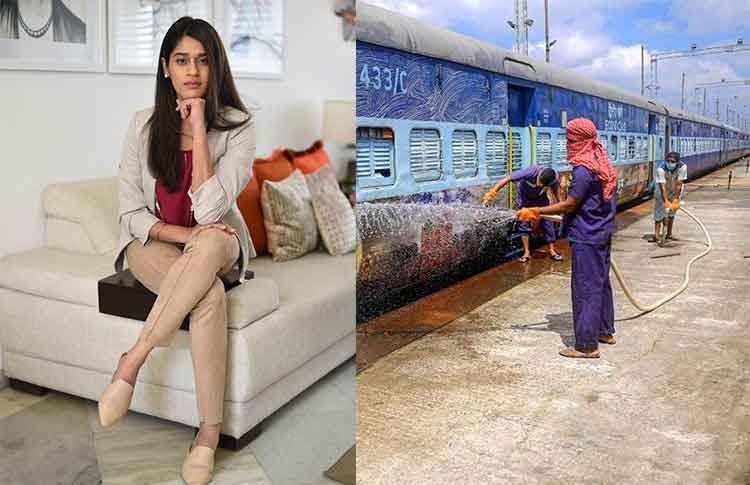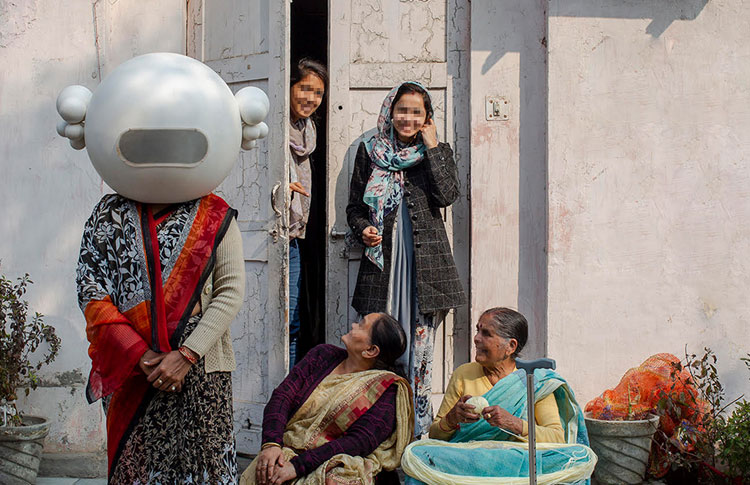Eco Warrior Seema Pardeshi Shares What Urged Her To Design A Menstrual Cup At Half Market Price
- IWB Post
- December 20, 2017

In today’s times, not often do you come across a person whose efforts are as sincere as their words. This was the thought I got greeted with, in a short time after I began my conversation with Mumbai-based Menstrual Cups Proponent, Eco Warrior Seema Pardeshi.
It is said that India has progressed tremendously in the last two decades, sure it has, but unfortunately its benefits didn’t outstretch across the social spectrum, and menstrual taboo remains as one of the many un-touched spheres. The attached wrong notions of hygiene and embarrassment are so deeply rooted in our culture, and not only men but women, too, are responsible for keeping them alive.
To make matters worse, a large percentage of females remain uneducated of their body behaviour and anatomy, and Seema’s interactions with women regarding the use of menstrual cups, told her no different.
“Menstrual talks need to find a place in our routine,” and practicing what she preaches, Seema has educated both her sons about menstrual health and finds them discussing it rather comfortably.
Regarding her menstrual-cup-movement, she shared, “I give lectures at schools, colleges, companies, and I am prepared with proper explanation and demonstration to clear all the possible doubts. Replacing sanitary napkins with menstrual cups is a choice proven healthy for both our body and environment. It’s only been a year, but I am glad to have encouraged many women to make the switch.”
After a successful 20-year long inning as a homemaker, Seema took on her passion for social work. What began with recycling sarees to make bags, gradually led her to lay the foundation of her NGO, Ashay. Not to give out more, read below about Seema’s applause-worthy endeavors:
Tell me about your life before you founded Ashay?
I graduated in Botany, and soon got married at the age of 22. I wanted to study further and dreamt of doing a Master’s degree, but the circumstances were such that I had to make a choice. My husband is the best thing that has happened to me, and it was my own decision to give priority to my children. Being a mother, I wanted to be there for them at every step, not only because they needed me, I wished to experience their growing years just as much!
That’s sweet. So which moment do you regard as the turning point?
I always wanted to work, from home, and so had earlier thought of opening a nursery. But with my husband’s transfer-prone government job (she laughed), it couldn’t have been made possible. But in the last decade, I constantly felt a self-knocking to help counsel senior citizens. I connect really well with them. But with no education and experience, the desire just lingered in my heart. And so the kick-start happened only four years ago, when one day my elder son, Tejas (20), seeming rather troubled, said, “Mumma, you’re so good at so many things, why don’t you work?”
I, too, had been feeling the same, my children were now in school and old enough to manage themselves. So that became ‘The Day’, I applied for Master’s in Social Work at IGNOU (open university) and with time got inclined to work for the environment. The first efforts towards which shaped up in the form of recycling sarees to make bags.
How did you come up with the idea of recycling sarees? Not really a saree lover, are you?
Ha-ha. So when my dreams of counseling didn’t see light because of lack of access to required facilities, I soon turned to work on my other passion, environment care. After completing the degree, for some time I worked with various NGOs, but eventually decided to do something on my own, and the mass use of Plastic bags had long been troubling me. That’s how I conceived the idea of making bags out of old but good quality sarees, and my inclination towards fashion designing and knowledge of stitching helped a great deal. Started with my own sarees, and slowly through word of mouth publicity, other women too began to donate.
Seema has a team working for her in Bhusawar, Maharashtra, and though she pays them for the stitching of bags, she only ‘gifts’, and has never ‘sold’ a bag!
And then how did your focus shift to ‘menstrual cups’?
In March 2016, I read an article on menstrual cups in Loksatta (Marathi Newspaper), which was written by a Bangalore-based journalist, and that left me intrigued. The unfathomable damage that sanitary napkins cause to our environment struck me. I soon contacted that journalist and three months later, when she came to Mumbai, we met. And as it is with fruitful coincidences, from her I got to know of a woman in Mumbai, who was already working to promote the use of menstrual cups. In no time, I was at her door!
Wow! What happened next?
She gave me a cup and taught me how to use it, and my apprehensions, same that I am able to sense in your tone, soon faded. Made of FDA approved soft silicone material, it is easy to put and can be used for 10-12 years. The fact that it stops us from mindlessly using and throwing sanitary napkins was the most important aspect. A study has proven it true that upon absorbing the vaginal fluid, the chemical used in pads forms a chemical dioxin, 0.02% of which penetrates in our body during every cycle. As for the environmental factor, one should follow the garbage-picking truck one day, to find out the repercussions of their ignorance themselves.
Hmmm. I learned that you are also working on designing a menstrual cup. A quick brief on that?
So when I looked for them online, one menstrual cup was priced approximately 1500. Not only could I myself afford it, but I also could not ask others to use it, for the long-term cost-balancing dynamics couldn’t have been explained. So I found substitutes priced around 1000, and began to approach women through Whatsapp, encouraging and educating them about its use. And alongside I began my research for the making of cup, after all a large number of women whom I have worked with belonged to Aanganwadi and slums, and I had to make it reach them, too.
After a year of trial and errors, I finally have a design in my hand, which would cost 555 INR. And I am glad to have brought down the price by at least 50 percent. But the post-designing process is as big a task, and I am working on it.
Brilliant. How supportive has your family been throughout?
Very supportive! My husband happens to be my biggest support. He is the one who got the element of “permission seeking” out of me; like it is for most women of our society, my conditioning was no different. He always told me that ‘I should tell and not ask him’. Which is what I taught my children, too, and I am proud to see how the upbringing reflects in their behaviour and actions.
That’s amazing. Any unforgettable memory of all the varied audiences you have addressed in the past year?
It was at a college once, also my first chance of interacting with an audience that had both boys and girls. In my presentation, I don’t just talk about menstrual cups, but about the female anatomy and menstrual health, too. The students were very receptive, but it was the response that I received from the boys that really took me aback, in a good way.
Few of them walked up to me at the end and thanked me for educating them about the hows and whys. “Until now we only wondered about ‘what really goes wrong’ with our girlfriends, mothers, sisters, and friends”, were their words, and then they further asked me about how one can help better their moods when on periods. Their caring attitude and gesture really touched me.
Oh and, have you been able to encourage ladies of your own family to switch to menstrual cups?
Yes, I have. I shared my knowledge with my sisters-in-law and thrilled by their positive response, provided them with one. Like myself, they and many other ladies have grown comfortable with cups!
That’s commendable. So in which other manner is recycling a part of your life?
Wet waste composting is a practice I have long been following. I maintain two baskets at my home, out of which one serves as the wet-compost bin. And both my sons know how to use it. As for the dry waste-basket, however much I try to avoid the use of plastic, it finds entry in my home one way or the other. And though I dispose it only once in two weeks, but every time I have to ask the bhaiya responsible for garbage disposal in our society, I feel really bad.
And lastly, what more will we be seeing you do in future?
I will always be working for the environment, and shall continue spreading awareness about the use of menstrual cups. Currently, I am looking forward to getting on the work of menstrual cup design, for the manufacturing of which I have come in contact with a few people. I have also made low-cost reusable plastic panties for the specially-abled girls to make them get rid of the uneasiness caused by pads. So will also be working on that, and alongside teach women to make affordable cotton pads.
Seema’s efforts were recently recognized by Pinkathon, India’s Biggest Women’s Marathon co-founded by Milind Soman. She acknowledges Sharmila Munj, popularly known as the first Pinkathon ambassador, for trusting her word about menstrual cups, and for the support she extended to Seema’s cause.
- 0
- 0













